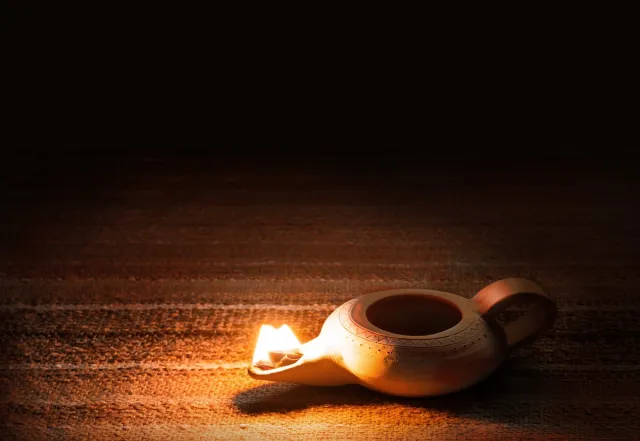The refusal of the wise virgins to share their oil with those without is simply due to the fact that such an allocation is not possible.
What the wise virgins possess is what the foolish virgins of the parable (Matthew 25:1-13) need: oil for their lamps. What does the oil signify?
The meaning of the oil
The theologian Origen (+253) speaks of the oil as “the word of teaching, with which the vessels of souls are filled — the oil of light.” We can think of the oil as symbolizing the virtue and interior illumination of those who have heard the Word of God and put it into practice. The oil is the energy of the Holy Spirit active in our lives. “The plenitude of oil,” remarks biblical scholar Dominican Fr. Nicholas of Gorran (+1295), “signifies compassion for one’s neighbor.”
Scripture commentator Erasmo Leiva-Merikakis offers this moving meditation on the oil and Jesus the Bridegroom:
Each one’s oil is the gift of each one’s virginity, gathered up into one and offered all at once to the Bridegroom for him to ignite with the fire of his love. Throughout a lifetime, the virginal person has radiated their capacity for love away from self and toward others by performing acts of self-surrender at once in the heart and in concrete interpersonal existence. This all-inclusive and wholly personal act of self-surrender is the “oil” for which the Bridegroom longs, because he made us for nothing other than everlasting union with himself in mutual joy, freedom, and delight.
Being out of oil
The refusal of the wise virgins to share their oil with those without is simply due to the fact that such an allocation is not possible. “No one can give them this oil, for it is the potency of life, the will and capacity to love” (Caryll Houselander).
It’s so easy for us to be like the foolish virgins. “Those who do not rejoice because they are inwardly pleasing to God have no oil with them” (St. Augustine). As St. Jerome observes, “The virgins that have oil are they who, besides their faith, have the ornament of good works. They that have not oil are they that seem to confess with like faith, but neglect the works of virtue.”
Leiva-Merikakis continues his reflection:
The oil of the foolish virgins’ devotion runs out because they have not “liquefied” and surrendered their entire being to the one they claim to love so much. The darkness of the oilless lamps signifies the tragic waste of a life that does not have as an animating principle the truth of Jesus’ words and his transforming presence.
A spiritual oil change
Just as we can’t drive our cars without getting a regular oil change, maybe we are in need of something similar in our spiritual life.
